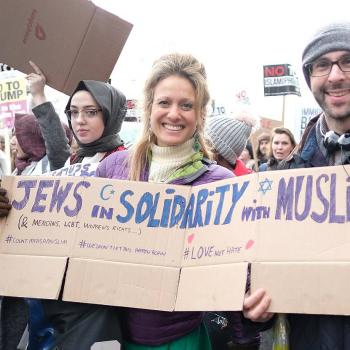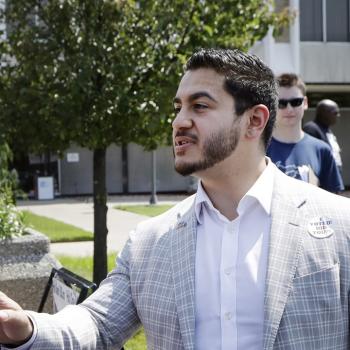 |
|
Sadek and his team
|
For all the attention placed on the problems and challenges facing Britain’s Muslim youth, problems addressed with particularly dark undertones of potential extremism and terrorism, practical advice from Muslims and non-Muslims alike has been scarce. Governments, Muslim organisations, and mosques have shifted both blame and responsibility between each other, while young people are left to fend for themselves. Even within the terminology of the debate – moderation, integration, unity – there are vague definitions and a lack of consensus, leaving a path to those goals harder to forge.
But many of the issues raised with British Muslim youth – alienation, discrimination, drugs, gang violence, and poor employment prospects – are also common to other non-Muslim ethnic minorities and the disenfranchised from all backgrounds. For those youth, trained social workers have been engaged by the government to address their needs on an individual basis. While Muslim youth can benefit from this as well, there are cultural and religious aspects for them that may make such an approach less effective than it could be.
Sadek Hamid, an educator and doctoral student at the University of Chester, noticed this discrepancy a few years ago and, with the help of the University and some (non-Muslim) colleagues created an accredited BA degree programme in Muslim youth work – a first for Britain and, in terms of rigour, probably the world. His programme saw the entry of its first students this September and a favourable response from Muslim community organisations and other universities could mean many more in the future. In this interview, we speak to Sadek about how the programme developed and he tells us about the stigma against social work, the goodwill of his colleagues, and whether his students “can get a job at the end of it.”
![]() Tell us a little bit about the degree programme.
Tell us a little bit about the degree programme.
Basically the idea for the course arose just over three years ago with my colleagues at the religious studies department at the University of Chester. They also have a Christian youth work programme running there for the last four or five years. As you know, Christian youth work is quite an established field in the UK. One of the professors on Islam was talking one day with the lecturer in Christian youth work, Richard Turner. Richard said, “Look, when I drive through Muslim communities, I see a lot of young people hanging about on corners and not getting up to much. Who’s working with these Muslim young people?” That was the origin of the course. A thought and observation turned into an intention to develop something parallel to Christian youth work.
I started at the university as a doctoral student in 2004 and my own professional background is in youth work. It was great timing, alhamdulillah, in that sense. It has taken us to where we are today, in terms of having a fully accredited BA undergraduate programme which is the first and the only one of its kind in the UK. As far as we’re aware, it’s the only one in the world.
The rationale is that in the UK – You’ve been in the UK now yourself for how long?
![]() Four years now.
Four years now.
So you must have a sense of some of the issues facing our community. A lot of the challenges are in the second and third generation. As you probably know, in the UK Muslim community, over 50% are under the age of 25. And with that, there’s a whole lot of statistics which aren’t so positive, really, when it comes to education and achievement. You’ve got, in particular, Bangladeshi and Pakistani communities are 45-50% underperforming, especially boys. You’ve got nearly 10% of the prison population [consisting of] Muslim young men. And you’ve got huge issues around drugs, criminality, and social problems – aside from the obvious ones around religious identity and the challenges and dilemmas around that, both positive and negative.
The bottom line is that there are very few qualified, professional, Muslim youth workers in the UK, particularly in the urban centres where Muslim populations are located. As an observation, I’ve been working professionally for the last 12 years and, alhamdulillah, have been involved in Islamic youth work for 20 years now. So I always knew there wasn’t enough of these workers and that’s why I myself went into it.
But youth work as a profession has yet to be really understood, recognised, and appreciated amongst our communities for various reasons, really. The obvious ones are around parents whose children are able to go to university tend to get encouraged to go the more prestigious, secure careers such as medicine. We are kind of overrepresented in those fields and where we don’t seem to be at the moment. We are not so interested in the social sciences, the caring professions if you like – teaching, social work, probation, youth work, etc. Those are the professions where we need to be encouraging more of our young people [to go] because that’s where the problems are, really. That’s where people will be equipped with the skills to make a difference.
Alhamdullilah, it’s changing but there’s still a lot of ignorance. A lot of people don’t actually know what youth work is. It’s not just the Muslim community, it’s wider society. Those people who do know, they have a stereotypical understanding – that youth workers just play with kids, play sports, pool, and table tennis.
![]() They think it’s about keeping young people busy rather than something more substantive.
They think it’s about keeping young people busy rather than something more substantive.
That’s right. Youth work, when it’s done properly, is a lot more than that. It has a recreation element, but a lot of it’s about informal education, it’s about inspiring young people, being a role model, providing support and guidance. The way I explain it to people, the easiest way to understand it is perhaps having an elder brother or sister to give you some guidance. And that’s really where it started and why we’re doing this.
![]() I’m curious about how you’ve structured this course. You mentioned that you’ve looked at parallels in Christian youth work. How has the course curriculum been developed to address the needs of Muslim youth? Is it simply adding a religious component onto it or is it more than that?
I’m curious about how you’ve structured this course. You mentioned that you’ve looked at parallels in Christian youth work. How has the course curriculum been developed to address the needs of Muslim youth? Is it simply adding a religious component onto it or is it more than that?
We were conscious of just cutting and pasting from the Christian youth work programmes. But at the same time, just to give you a little bit of background, youth work courses in the UK have a core generic element which all youth work courses have to have to fulfill a national youth work agency criteria and the professional standards associated with that. There are elements we must have which are universal.
The difference between our course and Christian youth work courses is it introduces a faith element, a faith perspective. For example, the first year is spread into five modules. The first module is key issues working with Muslim young people. Then the key skills required for working with young people. Then you have a module on Muslim studies, the academic skills required to work with Muslim communities. The fourth module is on professional practice and the fifth module is the practical, vocational aspects, which is the work placement.
What we’re doing is we’re trying to integrate rather than cut and paste. We’re trying to integrate a Muslim perspective. How does this relate, what are the key issues? We should know what the key issues are facing non-Muslim young people, facing Christian young people. What are the issues facing Muslim young people? How can we make the outcomes of this course relevant for people who have experience working with Muslim youth? We’re drawing a broad inspiration from Islamic teaching rather than promoting a specific madhab or aqeedah. We’re not touching on any sectarian or legal differences, we’re just using a broad, normative understanding of Islam. We’re drawing the values from there and relating it to the experiences of Muslims in the UK, basically.
For example, key issues in Muslim youth work will obviously begin with the experience on the ground for British Muslim young people. What are the issues? What is the profile? What are they doing? Where are they located? What is the whole life experience? The demographics of it. Then we’ll talk about the social issues. The economic issues, the political issues, and so on and so forth. Everything in those modules has to relate to an Islamic frame of reference in terms of where people are coming from but also connecting that to – Islam is our theory but the experience of British Muslims is the practice, is the reality. And then we synthesise that and connect that with the purposes and values of youth work.
This is quite cutting edge and not so easy to do in a sense because you’re creating a new understanding and certainly there isn’t just one understanding. Muslim youth work is still a work in progress. You are starting to see an emergence of different schools within Muslim youth work and it’s interesting, you know, and that’s the way it is with any kind of professional field, you do have different positions and different approaches. Our approach is to have Islam as our guiding ethos and values but it will manifest itself in different ways.
![]() How comfortable are Muslim communities with this sort of outreach work? Religion can be a very touchy subject and when you deal with a community’s kids, they may say “Well, this is Islam as we know it and maybe you should mind your own business.” Are you thinking of ways to overcome that cultural resistance to social work as something that’s needed?
How comfortable are Muslim communities with this sort of outreach work? Religion can be a very touchy subject and when you deal with a community’s kids, they may say “Well, this is Islam as we know it and maybe you should mind your own business.” Are you thinking of ways to overcome that cultural resistance to social work as something that’s needed?
I think the biggest challenge is that not so much a resistance to youth work as having a religious perspective, it’s actually an understanding of youth work itself and what it can do for a community’s young people. I think apathy is probably the biggest challenge we face in that people – not only parents but young people themselves. At the moment, our community is in the state of – it’s a mixed bag, isn’t it? I mean we do have, no doubt, the second or third generation, we have an element that’s very successful, that’s integrated, that’s confident, vibrant – it’s moving on and making a contribution to society.
I would argue that the majority of our communities are struggling with various sorts of economic and social disadvantage, discrimination and so on. So therefore, that informs the attitudes and perceptions of people, particularly in the north of Britain. There is a bit of a north-south divide, really.
But going back to your question, I don’t see that as a problem, really. The challenge is engagement and how you engage young people who are disillusioned, disaffected, who will use various real and imagined excuses for not doing the right thing and not improving their own condition. One of the main values of youth work is about personal empowerment. You help young people to discover the potential they have in themselves. You help them develop the skills and talents, and you nudge them in the right direction. You help them do it for themselves, otherwise you’re not a youth worker, you’re more like a babysitter.
![]() What’s been the response to the programme? How many students do you have enrolled?
What’s been the response to the programme? How many students do you have enrolled?
Alhamdulillah, the response has been interesting. Everywhere we’ve been, it’s been very positive. Parents, Islamic organisations, masajid, etc. We have about 20 students enrolled, though we had about 70+ people interested.
![]() It’s hard to be the first ones in a programme, isn’t it?
It’s hard to be the first ones in a programme, isn’t it?
Yeah, we expected there not to be an avalanche. Again, youth work isn’t really understood. One of the first questions people ask is “Well, I’m going to do this course. Can I get a job at the end of it?”
![]() Which leads to my other question. Would the graduates go into conventional organisations or are there other organisations you had in mind?
Which leads to my other question. Would the graduates go into conventional organisations or are there other organisations you had in mind?
This is one of the things we had to give a lot of thought to at the beginning. We wouldn’t have put this programme together if we didn’t feel there was a demand. Certainly, if you’re talking about mainstream youth services, there’s always a demand for youth workers. Given our communities are growing so fast, there is no doubt there will always be a demand for Muslim youth workers. That’s a given.
But also, we have found that, increasingly so, Muslim organisations and masajid, the ones who are well informed and progressive, they realise that they do need to have youth workers working within their institutions. There are very few, I must say, in the UK at the moment that employ full time youth workers. But that’s the ideal, in that people feel that they are getting into this profession because they want to work within their own community and make a difference. But at the moment, the opportunities within the Muslim sector are limited.
However, we are working strategically with the largest Muslim organisations, nationally and regionally, the masajid where there are affiliate organisations like the Lancashire Council of Mosques, the Bolton Council of Mosques, the MCB, the BMF and so on. They’re all interested in working with us and helping us, where necessary, to build capacity within masajid and that will really yield, in the next 2-3 years, the change that we need to employ [youth workers]. We’re working with the networks to help those masajid that want to employ youth workers to get from where they are now to the position where they have the skills to understand how to get financed and to do the things they need to do. The people who graduate, inshallah, by then they’ll have the local authority centres, they’ll have the voluntary sector where there is a lot of employment opportunities but, inshallah, they’ll have more Muslim organisations and masajid that will be able to offer them employment.
![]() It sounds then like this is the spark that makes other parts of the system more mature.
It sounds then like this is the spark that makes other parts of the system more mature.
Inshallah. The MCB recently launched an ambitious programme to build this capacity among masjids. I think there’s a sort of consensus growing within those communities to understand what’s going on and what needs to be done. Certainly our project will help accelerate some of those things that are already happening or going to happen. I think we have to be strategic in that sense.
I was very happy when I came across my colleagues the department because, you know, they’re not Muslim. For non-Muslims to be thinking about this, it’s quite a bold step for a mainstream institution, a British university to take. This is unheard of, really. It reflects a goodwill there. They really gave me a free hand to do this. We consulted widely and we’re open to anybody giving us advice. We’ve got some scholarly input as well from people like Tariq Ramadan, local Muslim organisations, imams.
I’m sure there’ll be lots of room for improvement, but we feel that this is a big breakthrough and we’d like to be, inshallah, an example of good practice to inspire people elsewhere. In the next two or three years, a limited number of universities will also be offering courses. We’re thinking ahead in the next few years to encourage people in other Muslim countries to come here and study. We’ve already had interest from some places to maybe go and train youth workers in Muslim countries. That would be great if we could make that happen. Aside from Malaysia, I’m not aware of any other Muslim countries that have Muslim youth workers employed as a field. We’re quite ambitious, inshallah.
Zahed Amanullah is associate editor of altmuslim. He is based in London, England.














